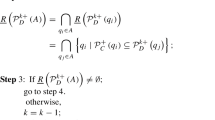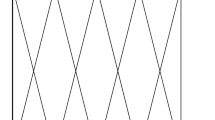Abstract
The extension of rough set model is a crucial and vast research direction in rough set theory. Meanwhile decision making can be considered as a mental process in which human beings make a choice among several alternatives. However, with the increasing complexity of real decision making problems, the decision makers frequently face the challenge of characterizing their preferences in an uncertain context. In the present paper, we initiate a multi attribute group decision making problem in the presence of multi attribute and multi decision in decision making with preferences. We further present the concept of soft preference relation and soft dominance relation corresponding to decision attribute in the multi criteria and multi decision information system. Further we put forward the idea of two types of optimistic/pessimistic multigranulation (soft dominance based optimistic/pessimistic multigranulation decision theoretic) approximations and their applications in solving a multi agent conflict analysis decision problem. The proposed method addresses the limitations of the Pawlak model and Sun’s conflict analysis model and thus improve these models. Finally, the results on labor management negotiation problems show that the proposed algorithms are more effective and efficient for feasible consensus strategy when compared with other techniques.
Similar content being viewed by others
References
Alcantud JCR (2002) Revealed indifference and models of choice behavior. J Math Psychol 46:418–430
Aldape-Perez M, Yanez-Marquez C, Camacho-Nieto O, Arguelles Cruz AJ (2012) An associative memory approach to medical decision support systems. Comput Methods Programs Biomed 106(3):287–307
Ali MI (2012) Another view on reduction of parameters in soft sets. J Appl Soft Comput 12:1814–1821
Ali MI, Feng F, Liu XY, Min WK, Shabir M (2009) On some new operations in soft set theory. Comput Math Appl 57:1547–1553
Ali MI, Shabir M, Naz M (2011) Algebraic structures of soft sets associated with new operations. Comput Math Appl 61:2647–2654
Arsene O, Dumitrache I, Mihu I (2015) Expert system for medicine diagnosis using software agents. Expert Syst Appl 42(4):1825–1834
Aydin S, Kahraman C, Kaya I (2012) A new fuzzy multicriteria decision making approach: an application for European quality award assessment. Knowl Based Syst 32:37–46
Azar AI, EI-Metwally SM (2013) Decision tree classifiers for automated medical diagnosis. Neural Comput Appl 23(7–8):2387–2403
Blszczynski J, Greco S, Slowinski R (2007) Multi-criteria classification a new scheme for application of dominance-based decision rules. Eur J Oper Res 181:1030–1044
Blszczynski J, Greco S, Slowinski R, Szelag M (2009) Monotonic variable consistency rough set approaches. Int J Approx Reason 20:979–999
Cagman N, Engino S (2010a) Soft matrix theory and its decision-making. Comput Math Appl 59:3308–3314
Cagman N, Engino S (2010b) Soft set theory and uni-int decision-making. Eur J Oper Res 207:848–855
Chang NB, Chen HW, Ning SK (2001) Identification of river water quality using the fuzzy synthetic evaluation approach. J Environ Manag 63:293–305
Deja R (1996) Conflict model with negotiation. Bull Pol Acad Sci Tech Sci 44(4):475–498
Deja R (2002) Conflict analysis. Int J Intell Syst 17:235–253
Deng X, Yao Y (2014) Decision-theoretic three-way approximations of fuzzy sets. Inf Sci 279:702–715
Dubois D, Fargier H, Prade H (2004) Ordinal and probabilistic representations of acceptance. J Artif Intell Res 22:23–56
Esfandiari N, Babavalian MR, Moghadam AME, Tabar VK (2014) Knowledge discovery in medicine: current issue and future trend. Expert Syst Appl 41(9):4434–4463
Feng F, Jun YB, Liu X, Li L (2010a) An adjustable approach to fuzzy soft set based decision making. J Comput Appl Math 234(1):10–20
Feng F, Li C, Davvaz B, Ali MI (2010b) Soft sets combined with fuzzy sets and rough sets: a tentative approach. Soft Comput 14(9):899–911
Feng F, Liu XY, Leoreanu-Fotea F, Jun YB (2011) Soft sets and soft rough sets. Inf Sci 181(6):1125–1137
Gau WL, Buehrer DJ (1993) Vague sets. IEEE Trans Syst Man Cybern 23:610–614
Greco S, Matarazzo B, Slowinski R (1999) Rough approximation of a preference relation by dominance relations. Eur J Oper Res 117:63–83
Greco S, Matarazzo B, Slowinski R (2001) Rough sets theory for multicriteria decision analysis. Eur J Oper Res 129:1–47
Greco S, Matarazzo B, Slowinski R (2002) Rough sets methodology for sorting problems in presence of multiple attributes and criteria. Eur J Oper Res 138(2):247–259
Greco S, Matarazzo B, Slowinski R (2006) Dominance-based rough set approach to decision involving a plurality of decision makers. In: Greco S et al (eds) Rough sets and current trends in computing. LNAI 4259. Springer, Berlin, pp 306–317
Greco S, Slowinski R, Zielniewicz P (2013) Putting dominance-based rough set approach and robust ordinal regression together. Decis Support Syst 54(2):891–903
Hu J, Chen XH (2010) Multi-criteria decision making method based on dominance relation and variable precision rough set. Syst Eng Electr 32(4):59–763
Huang B (2011) Graded dominance interval-based fuzzy objective information systems. Knowl Based Syst 24(7):1004–1012
Huang B, Li HX, Wei DK (2012) Dominance-based rough set model in intuitionistic fuzzy information systems. Knowl Based Syst 28:15–123
Inan U, Gul S, Imaz YH (2017) A multiple attribute decision model to compare the the firms occupational health and safety management perspectives. Saf Sci 91:221–231
Inuiguchi M, Yoshioka Y, Kusunoki Y (2009) Variable-precision dominance based rough set approach and attribute reduction. Int J Approx Reason 20:1199–1214
Ishizaka A, Nemery P (2013) Multi-criteria decision analysis: methods and software. Wiley, Hoboken
Jiang Y, Liu H, Tanga Y, Chen Q (2011) Semantic decision-making using ontology based soft sets. Math Comput Modell 53:1140–1149
Kotlwski W, Dembczynski K, Greco S, Slowinski R (2008) Stochastic dominance-based rough set model for ordinal classification. Inf Sci 178:4019–4037
Kreyea M, Gohb Y, Newnesa L, Goodwinc P (2012) Approaches to displaying information to assist decisions under uncertainty. Omega 40(6):682–692
Li SY, Li TR (2015) Incremental update of approximations in dominance-based rough sets approach under the variation of attribute values. Inf Sci 294:348–361
Lindgaard G, Pyper C, Frize M, Walker R (2009) Does Bayes have it? Decision support systems in diagnostic medicine. Int J Ind Ergon 39(3):524–532
Lingras P, Chen M, Miao DQ (2014) Qualitative and quantitative combinations of crisp and rough clustering schemes using dominance relations. Int J Approx Reason 55:238–258
Ma X, Zhan J, Ali MI, Mehmood N (2018) A survey of decision making methods based on two classes of hybrid soft set models. Artif Intell Rev 49(4):511–529
Maji PK, Biswas R, Roy AR (2003) Soft set theory. Comput Math Appl 45:555–562
Meng D, Zhang X, Qin K (2011) Soft rough fuzzy sets and soft fuzzy rough sets. Comput Math Appl 62(12):4635–4645
Molodtsov D (1999) Soft set theory—first results. Comput Math Appl 37:19–31
Moshkovich HM, Mechitov AI, Olson DL (2002) Rule induction in data mining: effect of ordinal scales. Expert Syst Appl 22:03–311
Mou Q, Xu Z, Liao L (2017) A graph based group decision making approach with intuitionistic fuzzy preference relations. Comput Ind Eng 110:138–150
Nguyen NT (2002) Consensus system for solving conflicts in distributed system. Inf Sci 1–4(147):91–122
Onisko A, Druzdzel MJ (2013) Impact of precision of Bayesian network parameters on accuracy of medical diagnostic systems. Artif Intell Med 57(3):197–206
Pawlak Z (1982) Rough sets. Int J Comput Inf Sci 11:341–356
Pawlak Z (1991) Rough sets, theoretical aspects of reasoning about data. Kluwer Academic Publishers, Dordrecht
Pawlak Z (1998) An inquiry into anatomy of conflicts. J Inf Sci 109:65–68
Pedrycz W (2013) Granular computing: analysis and design of intelligent systems. CRC Press/Francis Taylor, Boca Raton
Pedrycz W (2014) Allocation of information granularity in optimization and decision-making models: towards building the foundations of granular computing. Eur J Oper Res 232:137–145
Qian Y, Liang Y, Yao Y, Dang C (2010) MGRS: a multi-granulation rough set. Inf Sci 180(6):949–970
Qian Y, Li S, Liang J, Shi Z, Wang F (2014) Pessimistic rough set based decisions: a multigranulation fusion strategy. Inf Sci 264:196–210
Rodriguez R, Martinez L, Torra V, Xu Z, Herrera F (2014) Hesitant fuzzy sets: state of the art and future directions. Int J Intell Syst 29:495–524
Saaty T, Alexander J (1989) Conflict resolution: the analytic hierarchy process. Praeger, New York
Slezak D, Ziarko W (2005) The investigation of the Bayesian rough set model. Int J Approx Reason 40:81–91
Son LH, Thong NI (2015) Intuitionistic fuzzy recommender systems: an effective tool for medical diagnosis. Knowl Based Syst 74:133–150
Sun B, Ma W (2014) Soft fuzzy rough sets and its application in decision making. Artif Intell Rev 41(1):67–80
Sun B, Ma W (2015) Rough approximation of a preference relation by multi-decision dominance for a multi-agent conflict analysis problem. Inf Sci 315:39–53
Sun B, Ma W, Zhao H (2016) Rough set based conflict analysis model and method over two universes. Inf Sci 372:111–125
Xie G, Zhang JL, Lai KK, Yu L (2008) Variable precision rough set for group decision-making: an application. Int J Approx Reason 49:331–343
Xu WH, Zhang XT, Wang QR (2011) A generalized multi-granulation rough set approach. In: Huang DS, Gan Y, Premaratne P, Han K (eds) Bio-inspired computing and applications-7th international conference on intelligent computing, Zhengzhou, China, August 2011, pp 681–689
Yang XB, Qi Y, Yu DJ, Yu HL, Yang JY (2015) \(\alpha\)-Dominance relation and rough sets in interval-valued information systems. Inf Sci 294:334–347
Zadeh LA (1965) Fuzzy sets. Inf Control 8:33–353
Zadeh LA (1997) Toward a theory of fuzzy information granulation and its centrality in human reasoning and fuzzy logic. Fuzzy Sets Syst 19(2):111–127
Zhan J, Zhu K (2017) A novel soft rough fuzzy set: Z-soft rough fuzzy ideals of hemirings and corresponding decision making. Soft Comput 21(8):1923–1936
Ziarko W (1993) Variable precision rough set model. J Comput Syst Sci 46:39–59
Author information
Authors and Affiliations
Corresponding author
Ethics declarations
Conflict of interest
The authors declare that they have no known competing financial interests or personal relationships that could have appeared to influence the work reported in this paper.
Additional information
Publisher's Note
Springer Nature remains neutral with regard to jurisdictional claims in published maps and institutional affiliations.
Rights and permissions
About this article
Cite this article
Rehman, N., Ali, A. & Hila, K. Soft dominance based multigranulation decision theoretic rough sets and their applications in conflict problems. Artif Intell Rev 53, 6079–6110 (2020). https://doi.org/10.1007/s10462-020-09843-4
Published:
Issue Date:
DOI: https://doi.org/10.1007/s10462-020-09843-4




